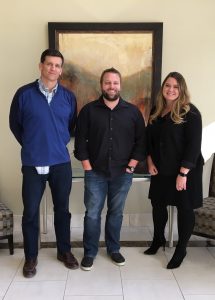Editor’s note: this story pairs with “BYU fellowship students help free innocent prisoners”
In 1994, an armed man robbed a Carl’s Jr. in Las Vegas, Nevada and killed the manager on duty. Eighteen-year-old DeMarlow Berry was identified by four eyewitnesses as the shooter and charged with first-degree murder, burglary, and robbery. A fifth witness said Berry confessed while they sat in a holding area together following his arrest.
When the jury reported it was deadlocked over a death penalty sentence, Berry was sentenced to life in prison with the possibility of parole for the murder charge, 10 years on the burglary conviction and 15 years on the robbery conviction — all to be served consecutively.
The Rocky Mountain Innocence Project took on Berry’s case in 2011. For two years, managing attorney Jennifer Springer compiled evidence of his innocence, including tracking down the real shooter and disproving the false allegation of guilt from the witness. Though their evidence was strong, the judge dismissed the appeal.
“It is exciting work and incredibly frustrating when you have such great evidence,” said Springer. “It was incredibly daunting and incredibly frustrating.”
In May 2014, the case was finally accepted by a judge, and on June 30, 2014, DeMarlow Berry was finally released after 23 years in prison.
“June 30 was a day I’ll never forget,” said Springer. “Coming home after being in prison 23 years, it was crazy and amazing at the same time.”
Berry’s wrongful conviction is a story that has happened to hundreds of others. According to Kurt London, managing attorney for the Rocky Mountain Innocence Center, the generally accepted statistic is that 2-3 percent of inmates currently in prison are innocent. A report analyzed by the Washington Post stated more than 2 million people are currently in prison. Two to three percent adds up to thousands of people who shouldn’t be serving time.

The Rocky Mountain Innocence Center (RMIC) works to exonerate those who have been wrongfully convicted of crimes in Utah, Nevada, and Wyoming. They also work to pass legal policy that tries to improve the system itself. London said groups like the center are crucial.
“We’re one of the biggest groups pushing for changes in the system. Without these innocence groups, (these people) would have no way to get back into court,” London said. “We’re constantly pushing for social change to make the situation better, for policy changes that are good for everyone.”
The average exoneree spent nine years in jail, according to data from the National Registry of Exonerations. Springer said that many of the cases the RMIC litigates are for life sentences, though they accept cases of those that have seven or more years left in their sentence.
The process of researching, litigating and ultimately exonerating a convicted person takes years. Whether or not the client is exonerated depends on how hard groups push against the system.
“Post-conviction work is an uphill battle because it’s tough to pursue claims of innocence,” said Springer. “Courts are about finality and deference is given to a guilty verdict in court. But we’re tenacious and we don’t go away easily.”
This tenacity has led to success in difficult cases, such as the recent exoneration of Berry, a Nevada native. But according to National Registry of Exonerations researcher Maurice Possley, the system isn’t fundamentally wrong.
“When cases come to trial, prosecutors don’t come to court thinking ‘I’m going to convict an innocent person,'” said Possley. “The system breaks down from bad police work, bad defense work, or bad court work.”
According to data compiled by the National Registry of Exonerations, official misconduct and perjury are the most common causes of wrongful convictions. Other causes include junk science, government misconduct, bad lawyering and incentivized informants.
Groups like the RMIC look for these red flags to identify and prove innocence. But they also try to push policy that will help prevent wrongful convictions from happening and help those who are trying to put their lives back together. The RMIC is currently lobbying in Nevada for compensation to assist the recently exonerated in the state.
Convicted persons released on parole are entitled to mental assistance, housing and receive job training while incarcerated according to the United States Department of Justice. A newly-released exoneree receives no such help in many states. Only 32 states currently provide some form of monetary compensation in such cases; Nevada is one of the 18 that do not.
Andrew Johnson was convicted on a rape charge in Wyoming in 1989. The RMIC ultimately helped exonerate him in 2013 at the age of 63. His application for compensation was denied. Though past retirement age, he currently works a part-time just to get by.
“Unfortunately, it took 24 years before he came home,” said Springer. “To spend 24 years of his adult life in prison for something he didn’t do was incredibly harmful psychologically. It was really hard for him.”
Overturning wrongful convictions is hard work, but important work as well. Groups like the RMIC will continue to pursue innocence until it no longer needs to be pursued.
“I’d be happy to lose this job if people are no longer being (wrongfully) incarcerated,” said Springer.




